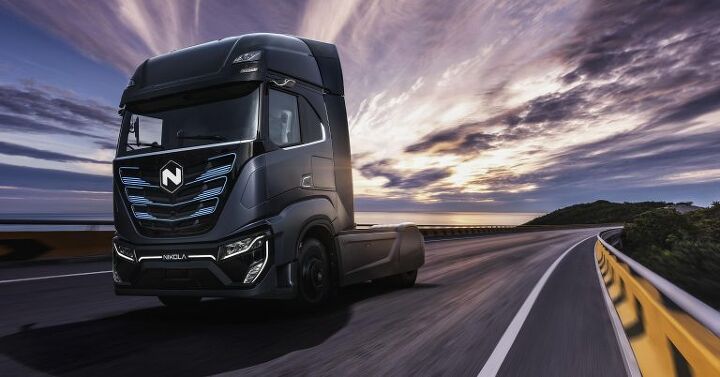JPMorgan Slams Brakes on Nikola's Stock

Nikola, the electric vehicle startup with no functional or sellable product to back up its insane valuation, just got a reality check from JPMorgan. The Wall Street firm has warned investors of a pullback of the company’s sky-high share price — an action that pretty much guarantees that exact outcome.
After catapulting into the stratosphere two weeks ago, Nikola’s stock stands to sink by nearly a third, the bank warns. That result would no doubt be gratifying for those annoyed by overvalued companies who promise investors the sun, moon, and stars.
A fresh face on the Nasdaq, Nikola made headlines for wooing Wall Street with promises of battery- and hydrogen-driven semi trucks and a full-size EV pickup built with the help of an unnamed (nonexistent?) automaker. On Friday, June 5th, the company’s stock price hovered just under $36 per share. By the following Tuesday, Nikola Corp. was trading for just under $80.
Nikola now sits around $66, with a market cap of $24 billion, despite the company forecasting not a single cent of revenue in 2020 and production vehicles not arriving on the scene for another few years. An American assembly plant is projected for 2028.
In a note Monday, JPMorgan saddled the company with a “neutral” rating and a price target of $45, which is a 32-percent decline from Friday’s close. The early excitement can’t last, it said, adding that Nikola isn’t immune from the hurdles facing other startups.
That said, JPMorgan liked what it saw in Nikola’s plans, assuming the company can pull it off.
“NKLA is poised to disrupt the transportation industry with rapid deployment of hydrogen infrastructure and FCEV powered vehicles for use on long haul trucking routes, reducing CO2 emissions meaningfully and positioning the firm for a key role in the future hydrogen economy,” JPMorgan analyst Paul Coster and co. wrote in the note.
“The resulting business model could be compelling, however risks are elevated for this pre-revenue company, and the stock looks fully valued here, so we look for a pull-back or incremental positive developments to get more constructive.”
JPMorgan forecasts earnings before interest and taxes of $1.5 to $2.0 billion and nearly $14 billion of revenue “as early as 2027,” and a “strong cash flow” into the next decade.
While Nikola’s share price initially wobbled downward, it has since recovered, up a fraction of a percent over Friday’s close.
[Source: Seeking Alpha] [Image: Nikola]

More by Steph Willems
Latest Car Reviews
Read moreLatest Product Reviews
Read moreRecent Comments
- Jalop1991 is this anything like a cheap high end German car?
- HotRod Not me personally, but yes - lower prices will dramatically increase the EV's appeal.
- Slavuta "the price isn’t terrible by current EV standards, starting at $47,200"Not terrible for a new Toyota model. But for a Vietnamese no-name, this is terrible.
- Slavuta This is catch22 for me. I would take RAV4 for the powertrain alone. And I wouldn't take it for the same thing. Engines have history of issues and transmission shifts like glass. So, the advantage over hard-working 1.5 is lost.My answer is simple - CX5. This is Japan built, excellent car which has only one shortage - the trunk space.
- Slavuta "Toyota engineers have told us that they intentionally build their powertrains with longevity in mind"Engine is exactly the area where Toyota 4cyl engines had big issues even recently. There was no longevity of any kind. They didn't break, they just consumed so much oil that it was like fueling gasoline and feeding oil every time


































Comments
Join the conversation
It's not question of the lenght in Scandinavia, question is cost-efficiency. Nose feets means more weight, more fuel consumption, visibility and econimically it's waste of feets. Cab trucks can take more payload which means more money and it's huge diffrence if your payload is 40 ton than 115 ton when you look your check. Plus it's enviromentally-friendly drive maximum payloads. Finnish truckmaker Sisu launched last year hybrid Polar series, which means big drops of emissions, fuel consumption and still it's has 930hp. You should not disapprove cab models, before your have drive in a proper one.
Sisu videos https://youtu.be/8pYKKZNJIfA timber Sisu, why Cab is so superior https://youtu.be/pNcKDY71mxw